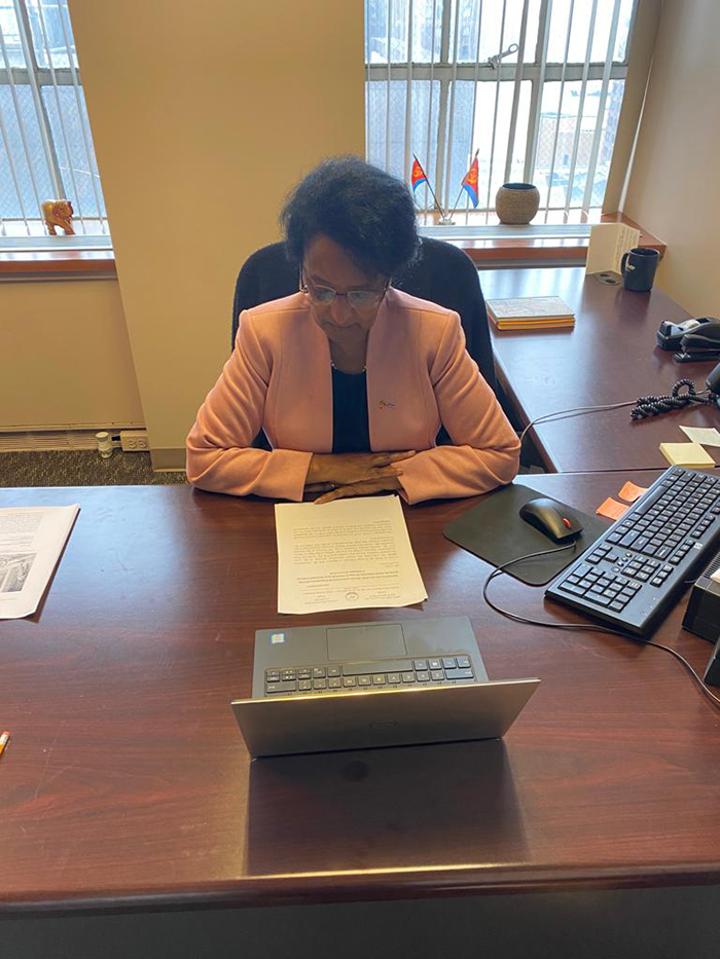
Statement by Ms. Elsa Haile, Director of International Organizations Division, during the Annual Ministerial Meeting of the Least Developed Countries
17 September 2021, New York
Mr. Chair,
Excellencies,
I wish to thank the Foreign Minister of Malawi, H.E Mr. Eisenhower Mkaka for convening this annual Ministerial Meeting of the Least Developed Countries. Let me also warmly greet H.E. Mr. Soltan bin Saad Al-Muraikhi, Minister of State for Foreign Affairs of the State of Qatar, H.E. Mr. Abdulla Shahid, President of the 76th Session of the General Assembly, Ms. Amina Mohammed, Deputy Secretary-General and Under Secretary General and High Representative of the UN-OHRLLS Mr. Courtney Rattray.
This meeting is timely as we are entering the negotiation process towards the Fifth United Nations Conference on the LDCs (LDC5). My delegation hopes that this meeting will help us to listen to challenges faced by our respective countries and foster a common agenda for our multilateral engagement.
Mr. Chair,
Excellencies,
The COVID pandemic has presented unprecedented challenges to every country. We should acknowledge the social, economic and health consequences of the crisis as we discuss the fifth program of Action of LDCs.
Our starting point for the discussion should be a realistic assessment of the global economic, financial and political structures and relations. We should ask ourselves why, after five decades, only six countries have graduated from the LDC group. The policy frameworks espoused by international economic and financial institutions are rigged against the people in the developing world. The promises of better economic performance through deregulation, privatisation, liberalisation and small government has not brought the promised development. It only has bonded nations in Africa in exploitative economic relations. A lesson of the COVID pandemic is that government matters. The Public sector matters. Society can not rely on the private sector alone to provide critical services, nor is the private sector efficient in disbursing limited resources to serve the interest of the masses. The intervention of governments through injecting cash in the economy, and not the performance of the private sector, will be the defining factor on how nations bounce back from the socio-economic effects of the pandemic. Successful implementation of Agenda 2030 demands rethinking our economic models, working together and demonstrating solidarity.
We should advocate for a global economic order that strives for equality and improves the quality of life of those at the lowest development ladder. LDCs should be afforded the policy space to set out their priorities and plan and decide their respective economic model of development without any conditionality and strike a balance in the allocation of resources between competing economic and social sectors. Developed countries should refrain from taking restrictive financial and political measures, including unilateral sanctions and other coercive measures.
The upcoming program of action should not be about what more the LDCs can do but rather address on how to revamp global commitment towards internationally agreed development goals for LDC emerging challenges. An important challenge in the implementation of the international development agenda has been the shrinking of commitment. We bear primary responsibility for developing our countries and that external support, even the most generous, cannot substitute our own efforts. However, it is the responsibility of all, including nations who command resources, to ensure that the international commitments towards the LDCs are fulfilled. International cooperation should not be viewed as a charity to developing countries with less regard to their priorities or as a means to extract economic and political concessions.
Mr. Chair,
Excellencies,
We must put all our efforts into ensuring that no other decade passes without eradicating poverty or ensuring tangible economic progress in our countries. The COVID19 pandemic has really exposed the inequalities between countries and regions.
Let me conclude by saying that the GA will have many in-person meetings in the coming days and weeks. While we all must take the necessary protective measures against the spread of COVID, we need to be mindful that such actions will not discriminate against any nation. This is particularly important as the growing gap between the haves and have-nots has manifested in the global vaccine rollout.
I thank you for your attention.






